Categoría Knowledge

Social innovation laboratories for the design of drug policies that are more connected to social dynamics
Home Knowledge
Santiago de Chile on 2-3 April.
Within the framework of the COPOLAD III programme, ALC has promoted the implementation of a network of five social innovation laboratories in Chile, Colombia, Peru and Uruguay. Our work has focused on supporting innovation processes with local institutions and organisations, seeking to generate spaces for collaboration and experimentation in order to design public policies that are more connected to social dynamics.
After two years of experimentation, the event in Santiago de Chile aims to share the lessons learned and challenges of the social innovation approach applied to drug policies. This meeting will be an opportunity to reflect in depth on the challenges faced, the emerging opportunities and the connections with global trends in innovation and public policies.
The reflections and learning generated in this space will be fundamental to optimise the innovation strategy of the COPOLAD III programme. In addition, the main learnings and results will be collected in a publication that aims to be a reference for future initiatives in this field.
Home Knowledge
ALC at the Meeting for the Creation of the Centre of Competences for Social Innovation in Spain
On 17 December, Agirre Lehendakaria Center participated in the meeting organised by the Secretary of State for Social Rights to consolidate a Competence Centre for Social Innovation (CCIS) in Spain. This project is part of the European Social Innovation Initiative, promoted by the European Commission in the context of the European Social Fund Plus (ESF+).
Boosting Social Innovation Ecosystems
These Centres are part of the European Social Innovation Initiative, promoted by the European Commission in the context of the European Social Fund Plus (ESF+), and aim to encourage the creation of social innovation ecosystems in all member countries.
Through this initiative, the aim is to foster an environment that multiplies opportunities for collaborative learning between diverse actors, allowing complex social challenges to be addressed in a systemic way. With an approach oriented towards the creation of a continuous process of community listening, promoting open and integrated participation of actors, methodologies and actions to generate innovative and adapted responses to social needs.
International Collaboration in the BIRDS Project.
The Secretary of State for Social Rights is part of a consortium with Portugal (Portugal Social Innovation), Sweden (Swedish Forum for Social Innovation) and France (Avise) to promote the BIRDS (Building Inclusive, Resilient and Dynamic Societies) project for the period 2024-2027. This partnership aims to strengthen social innovation in Europe through transnational collaboration and knowledge exchange.
ALC is working on a reseach project on the social impact of Science, Technology and Innovation policies in the Basque Country
Home Knowledge
The Basque Vice-Ministry of Science and Innovation has commissioned the Agirre Lehendakaria Center (Euskampus) to coordinate a research project on public science, technology and innovation policies in the Basque Country from 1980 to 2030, covering the period from the restoration of self-government to the present day. The main aim of this project is to collaboratively interpret our recent past, strengthen the current strategy of the Basque Government and project it into the future, reinforcing its international position.
The research, directed by Cristina Uriarte from the University of the Basque Country, will include a strong focus on identifying narratives and perceptions, an area in which the ALC specialises, as well as having solid experience in the analysis of the socioeconomic transformation of Basque society. As a complement, an analysis will be carried out from the perspective of social innovation portfolio and a comparison with other European regions and states with similar characteristics. Columbia University, a founding partner of the Agirre Lehendakaria Center, will contribute to the evaluation, comparison and international positioning of this research.
The fundamental mission and added value of this research is to collaboratively interpret our recent past, enrich our current strategy and project it towards the future, reinforcing its international positioning.
Context
The year 2030 will mark 50 years of Basque R&D&I policy promoted by the Basque Government. Although there are various studies on the impact of Science, Technology and Innovation policies on the development of the Basque Autonomous Community, there is a lack of sources of information and detailed and properly referenced data, as well as a lack of a broad historical analysis of the path taken. Likewise, it is increasingly necessary to analyse policies in terms of their social impact. How and whom have they affected? What have been their main impacts? What perceptions are there of them? How do they relate to each other and what has made them possible? What value system do they have at their foundation?
The study will include the collection and analysis of quantitative and qualitative data to assess the strategic decisions taken, some of them counter-cyclical, with the aim of identifying a narrative of its own that reinforces the international positioning of the Basque Country in this field. Likewise, an archive will be designed that synthesises and integrates information on policies, plans and tools, and will map key agents and actions (both public and private), milestones, historical context and thematic areas, among others, to understand the evolution of the ecosystem of relationships in different historical periods.
The expected results include a digital repository of key documents, a system for monitoring the Basque scientific ecosystem, a collection of historical publications and the organisation of international seminars. The aim is not only to document the past, but also to propose concrete improvements to align the R&D&I strategy with other strategic initiatives of the Basque Government and with society.
On Thursday 23rd January, the Agirre Lehendakaria Center (ALC) and itdUPM / Atelier Itd teams met in Bilbao to explore new opportunities for collaboration.
This meeting represents a milestone in the relationship between the two organisations, which has lasted for more than a decade and has been characterised by joint projects and innovative conceptualisations in the field of social innovation.
ItdUPM (Polytechnic University of Madrid) has established itself as a referent in innovation and sustainability and its mission complements the objectives of the ALC. Over the years, both organisations have worked together on academic and experimental initiatives, with the Lada and Velilla platforms standing out as processes of just transition and sustainable development.
The aim of the workshop was to consolidate the mutual commitment between ALC and itdUPM and identify concrete actions for the future. This space allowed a strategic reflection on new areas of collaboration, taking advantage of previous experiences and strengthening a shared vision based on social innovation, alliances and the cultural dimension of social innovation.
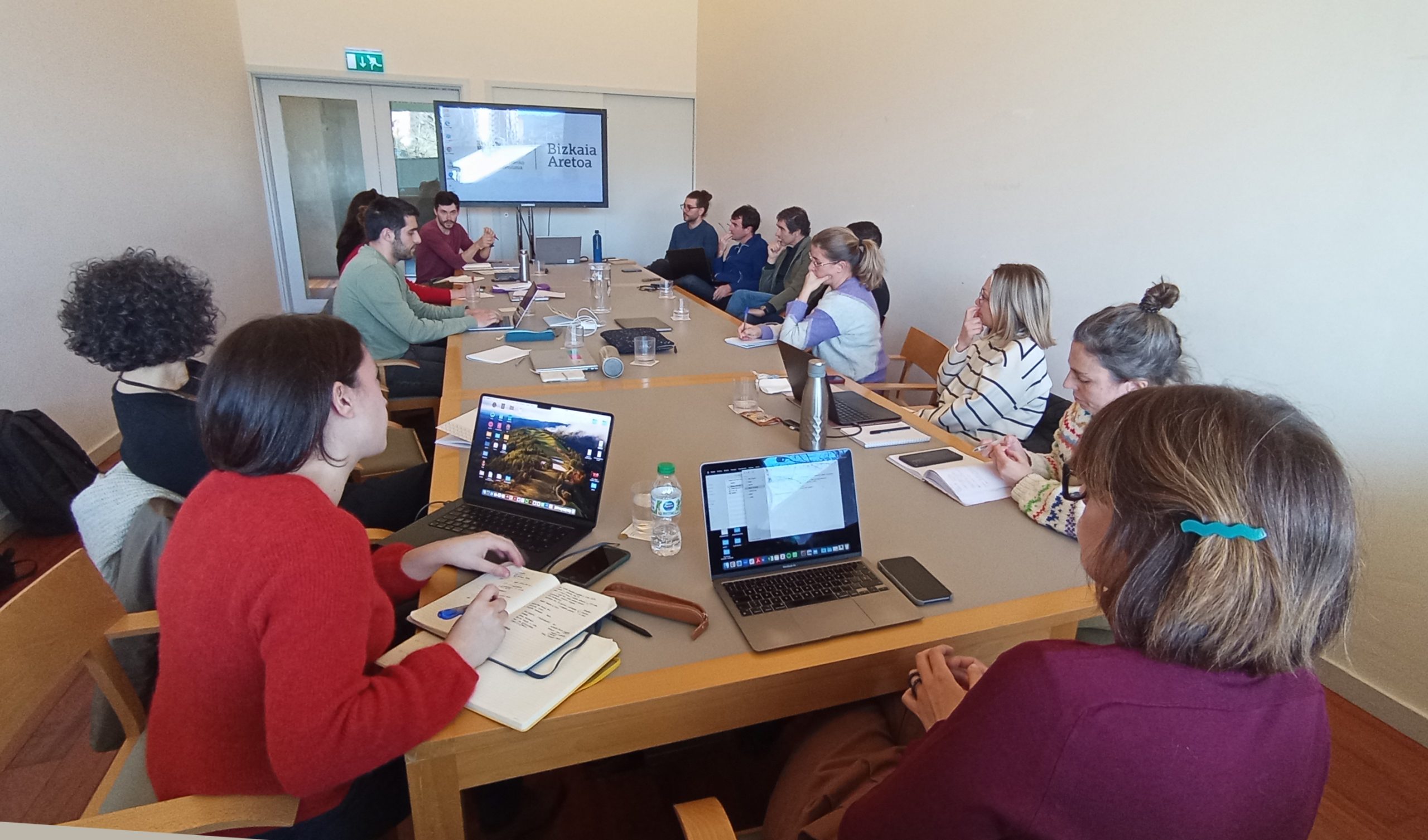
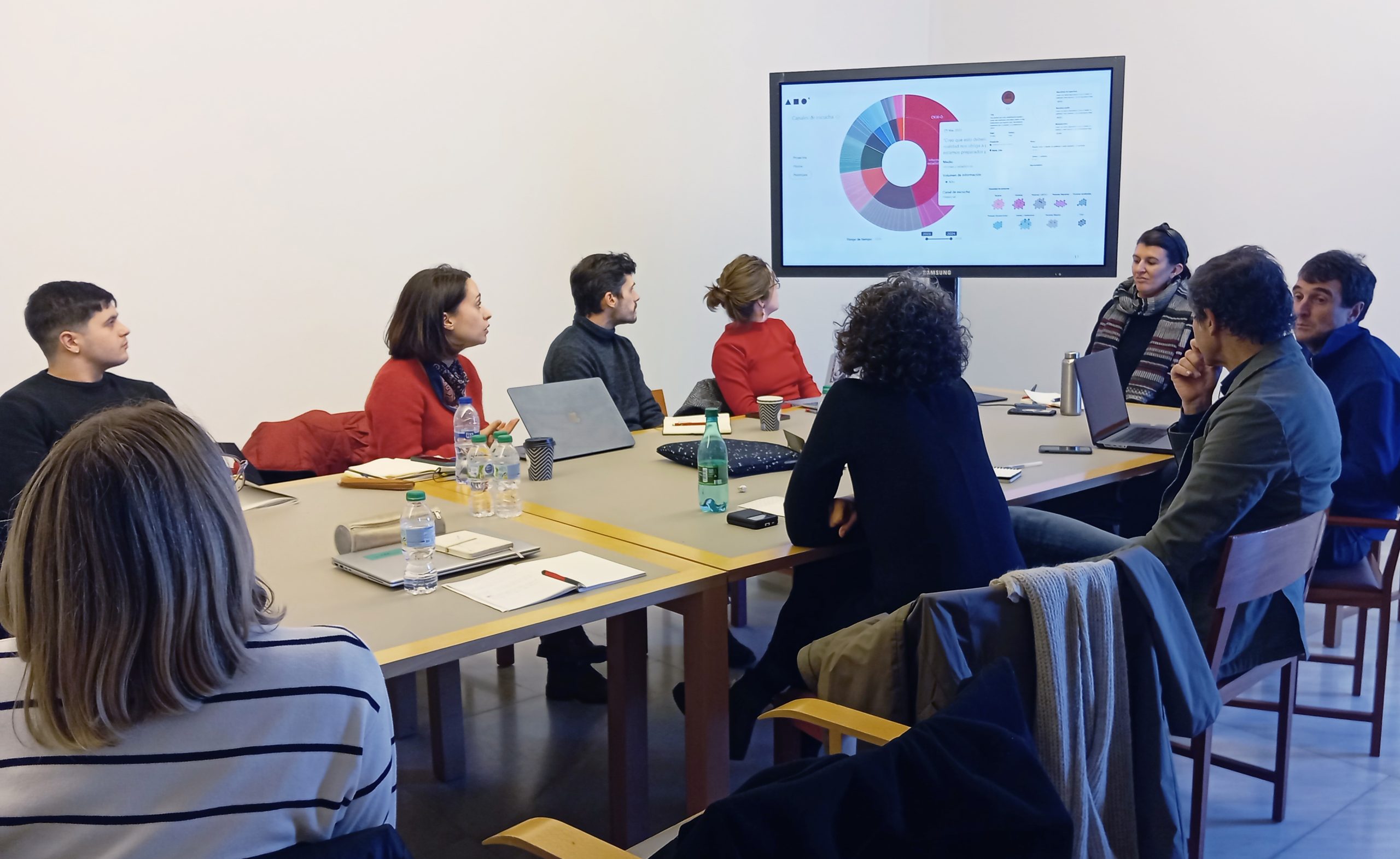
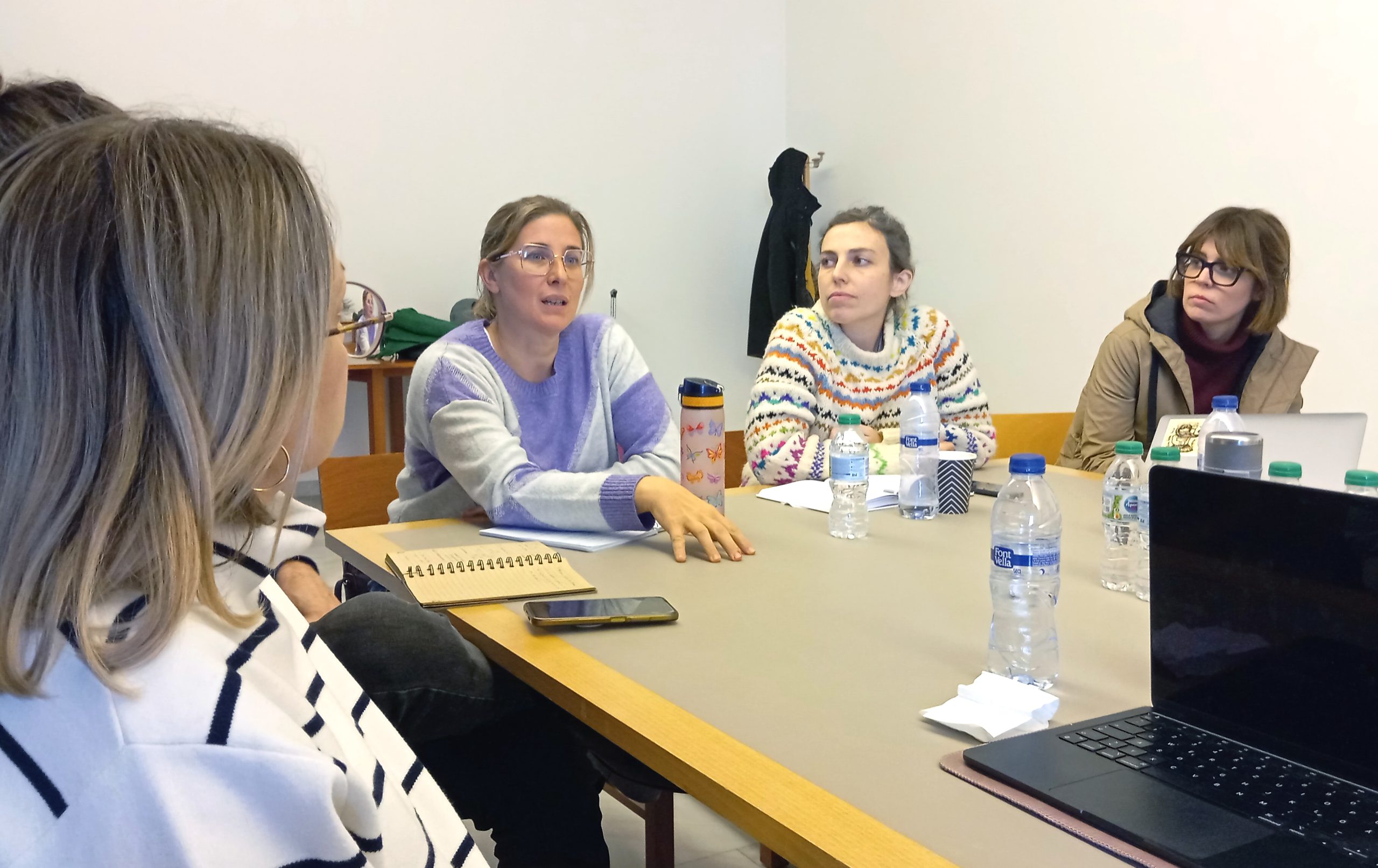
Interview in Bizkaia Irratia about the K magazine (17.07.2024): "We analyse what is behind the real price of the "pintxo-pote""
Home Knowledge
ALC participates in the UIK summer course "Arantzazun bizi: iragana, orainaldia eta etorkizuna zer?"
Home Knowledge
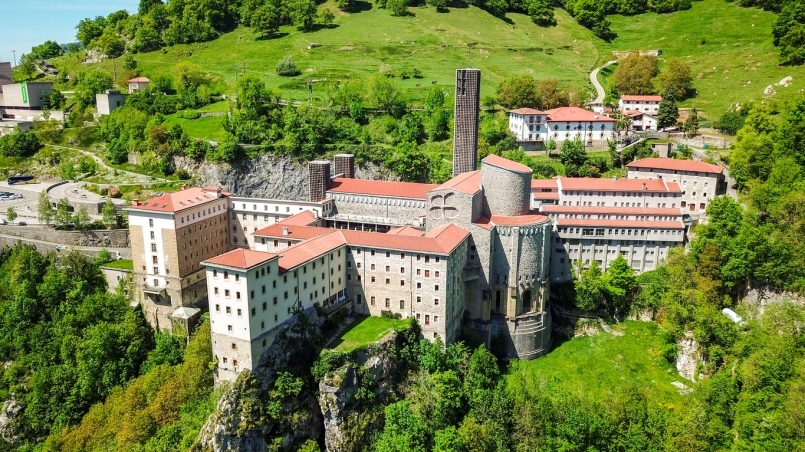
The course will take place in Arantzazulab on 22 and 23 July, with the aim of exploring and deepening the identity and meaning of Arantzazu as a space of reference for Basque society. Through the joint analysis of the natural and cultural trails that link the future of Arantzazu with that of the Basque Country, the aim is to understand the contribution of this place in the formation of a diverse and united community. The session seeks to address essential questions about the continuity of the legacy of figures such as Gandiaga and Azurmendi, as well as about the creation of new forms of cooperation. In addition, research will be carried out on how Arantzazu can continue to be a meeting and reflection point to respond to the complex challenges of the future.
Agirre Lehendakaria Center (ALC) will participate in the roundtable "Euskal Herriaren etorkizuna Arantzazu-tik: Behar al dugu gure herriaren biziraupenerako sustraiko gaien inguruan herri anbizioz aritzeko eta pentsamendu berria sortzeko gunerik?" which will take place on 23 July, from 11:30 a.m. to 12:45 p.m., together with Urko Aiartza Azurtza, director of TMelab; Mireia Zárate Aguirre, director of the Sabino Arana Fundazioa; Naiara Goia Imaz, director of Arantzazulab; and with Antonio Casado da Rocha from the UPV/EHU as moderator.
Evaluating the Efficacy of Social Innovation Programming at Advancing Rural Development in the Context of Exogenous Shocks
Home Knowledge
An article by Work4Progress partners Mauricio Espinoza, Rodrigo Rivarolam Ricardo Fort and Joshua Fisher for the Sustainability journal.
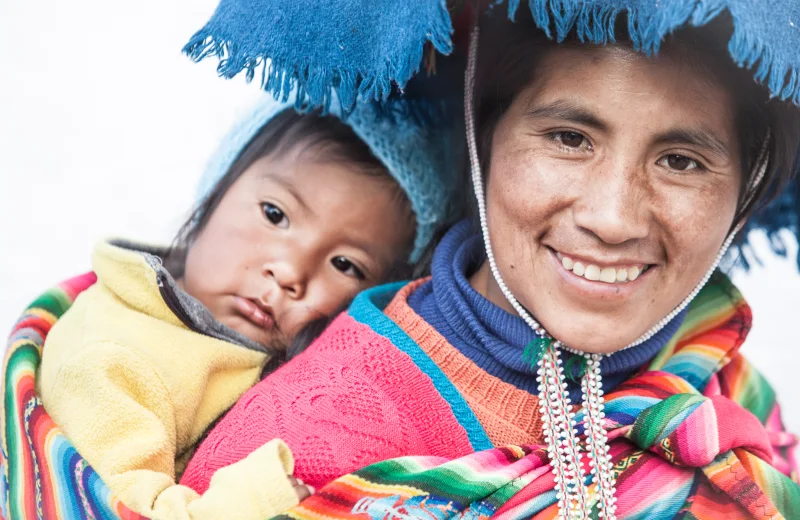
This paper designs and deploys an experimental approach to evaluate the efficacy of a social innovation initiative implemented in rural communities situated in the highlands of Peru, which confronted the challenges posed by the COVID-19 pandemic in the midst of its implementation. Using three rounds of information collected before, during, and after participation, the efficacy of the social innovation economic development approach at increasing household livelihoods is examined. The study presents robust, statistically significant improvements in household economic well-being, food security satisfaction, and community outlook for participating households compared to non-participating households following program engagement. The results suggest that the social innovation program facilitated a notable restructuring of the portfolio of household income and livelihood activities towards more lucrative and value-added pursuits. This transition manifested in increased involvement in entrepreneurial ventures and specialized labor associated with both agricultural and non-agricultural sectors while distancing from traditional agricultural and livestock-related endeavors. The income gains stemming from self-employment activities and wage labor outweigh the losses incurred from reduced agricultural and livestock earnings. Furthermore, the analysis underscores the resilience of innovative income-generating pathways in the face of the COVID-19 pandemic, outperforming traditional agrarian value chains. These findings highlight the efficacy of social innovation programming in facilitating economic development and also shed light on sustainable strategies for economic resilience amidst unforeseen challenges such as the recent global health crisis.
ALC participates in the conference organised by the Department of Health of the Basque Government to improve health and well-being in the community
Home Knowledge

In November last year, the project "Promoting local community action to enhance health and well-being" was launched in the Basque Country, financed by the European Union and with technical advice from the OCDE. This project is being developed by various institutions, agents and entities that operate at the community level in the Basque Country.
In this context, on 2 July 2024 we participated in the panel discussion "What lessons or strong ideas can be derived for the Basque Country?" at the conference "Promoting local community action to enhance health and well-being", organised by the Department of Health of the Basque Government and the OECD, with the aim of analysing the progress made so far and sharing good practices from the international arena.
The panel had various people linked to community action to bring the lessons presented throughout the day to fruition, in order to draw conclusions on how they can be applied in the context of the Basque Country. We participated together with Rosana Peiro, Coordinator of XarxaSalut; Elena Albisua Kortazar, Deputy Director of Public Health of Gipuzkoa; Rafael López Arostegi, Department of Welfare, Youth and Demographic Challenge; and Inés Urieta, who was in charge of moderating the session.
We presented our approach based on Developmental Evaluation compared to traditional evaluation systems, which allows us to monitor in real time the approach to complex challenges, and how we are already working through this approach in the field of health and care.
Interview in Euskadi Irratia about the K magazine (26.06.2024): "The magazine has a double objective: it aims to lay on the table the future challenges of Basque society from a critical perspective and to encourage citizen participation"
Home Knowledge
Promoting community coordination through the co-creation of the first “lokarriak” table in the Compassionate Community of Getxo
Home Knowledge

On April 25, 2024, a collective sensemaking took place, to contrast the most significant changes and the portfolio of agents and initiatives of Getxo Zurekin, and the Compassionate Community that has been formed in the municipality through this process. From this session, the need of generating a space and/or tool that allows the coordination of the different agents that participate in the existing resources and/or that are positioned as a gateway between them and the community arised. To this end, Agirre Lehendakaria Center, in collaboration with the Getxo Bihozbera association and Fundación Doble Sonrisa, convened a session on 14 June to address this new opportunity in the articulation of the Compassionate Community of Getxo through the co-creation of a “lokarriak” table.
The session was attended by approximately 30 people, including people involved in the Compassionate Community of Getxo (Fundación Doble Sonrisa, Getxo Zurekin and Getxo Bihozbera), social and health personnel from the area (Romo Kultur Etxea, primary care, community nurses, palliative care units), officials of the Getxo City Council, third sector associations linked to Getxo Zurekin and the Deputy Directorate of Osakidetza.
Most significant changes in perceptions
To contextualize the session, the metanarratives that operate in the ecosystem and that reflect the most significant changes of the Developmental Evaluation process that occurred in the Compassionate Community from 2017 to 2024 were presented.

Although these profiles were already contrasted in depth in the session of April 25, new reflections emerged, such as the importance of networking between the different agents of the Compassionate Community; the need for a mapping and visualization of the different lokarriak figures that exist both in third sector entities and in public institutions; the relevance of the community as a fundamental pillar in care; or the challenge of public health in terms of the agility of care.
Co-creation of the “lokarriak” table
For the second part of the session, the attendees worked at tables with other agents of the ecosystem, for 50 minutes, on a prototype canva, to answer the following questions:
- What are the key actors, institutions and people in the ecosystem.
- Who we are targeting, the specific segments of the population involved in care.
- At what territorial level is it intended to act.
- How we communicate, both internally and externally.
- What are the connections with existing initiatives in the ecosystem.
- What are the key activities and how they are going to be developed, what is the role of the agents in them.
- What are the key resources, both material and human.
- What financing model could the prototype have.
- What is the time horizon for the implementation of the prototype.
- What is the added value of the prototype.
- How we evaluate the prototype.
Subsequently, the groups shared their work, resulting in the following prototype canva:

Closure of the session
The space was perceived as an opportunity to get to know each other, generate networks of trust and work collaboratively for the benefit of the community. In addition, the need to create this kind of spaces on a regular basis and to specify the topics and needs discussed at the meeting was expressed. As a first step, several people suggested starting with a mapping of the existing resources in Getxo, to share it with the rest of the agents.
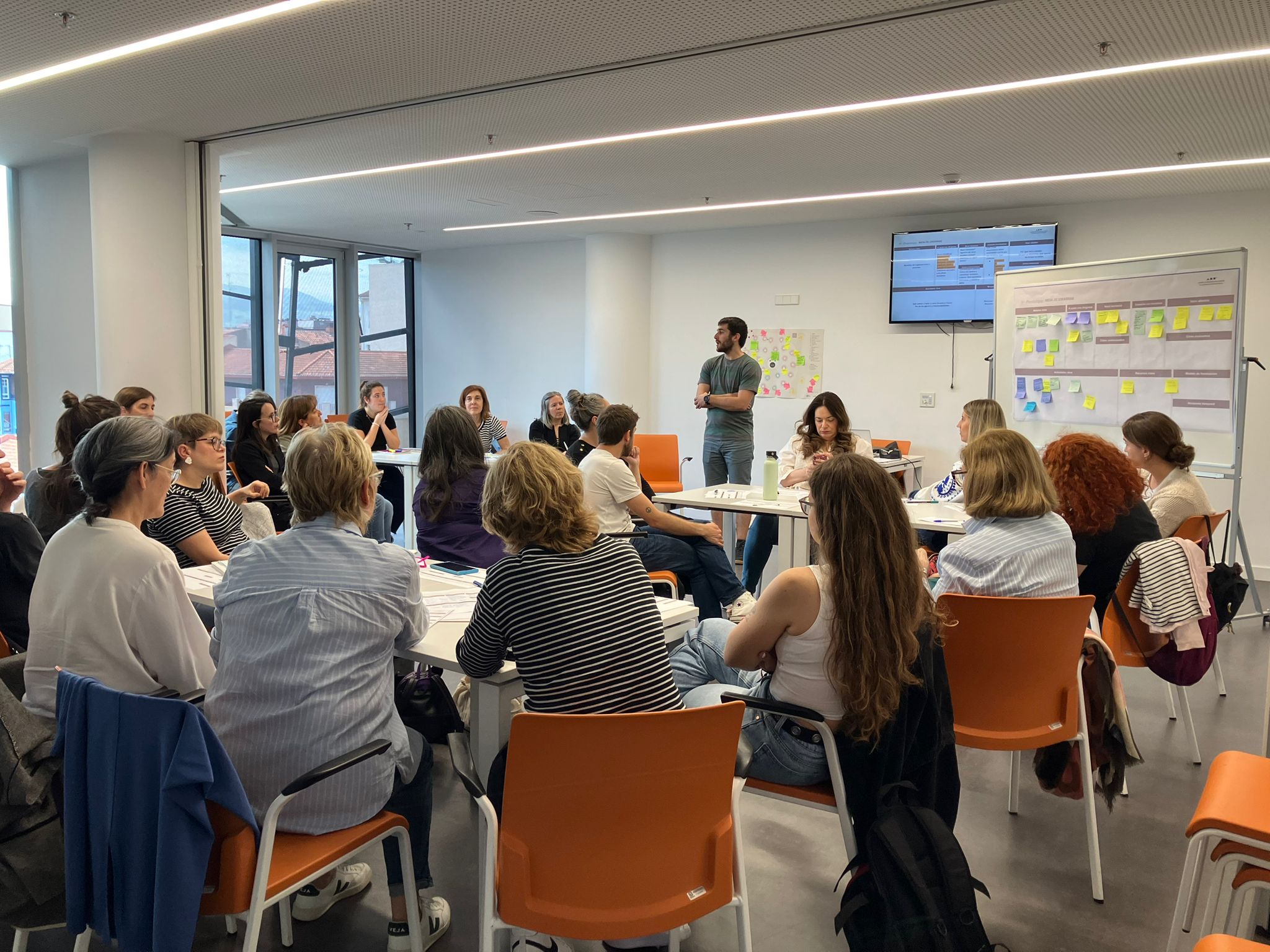
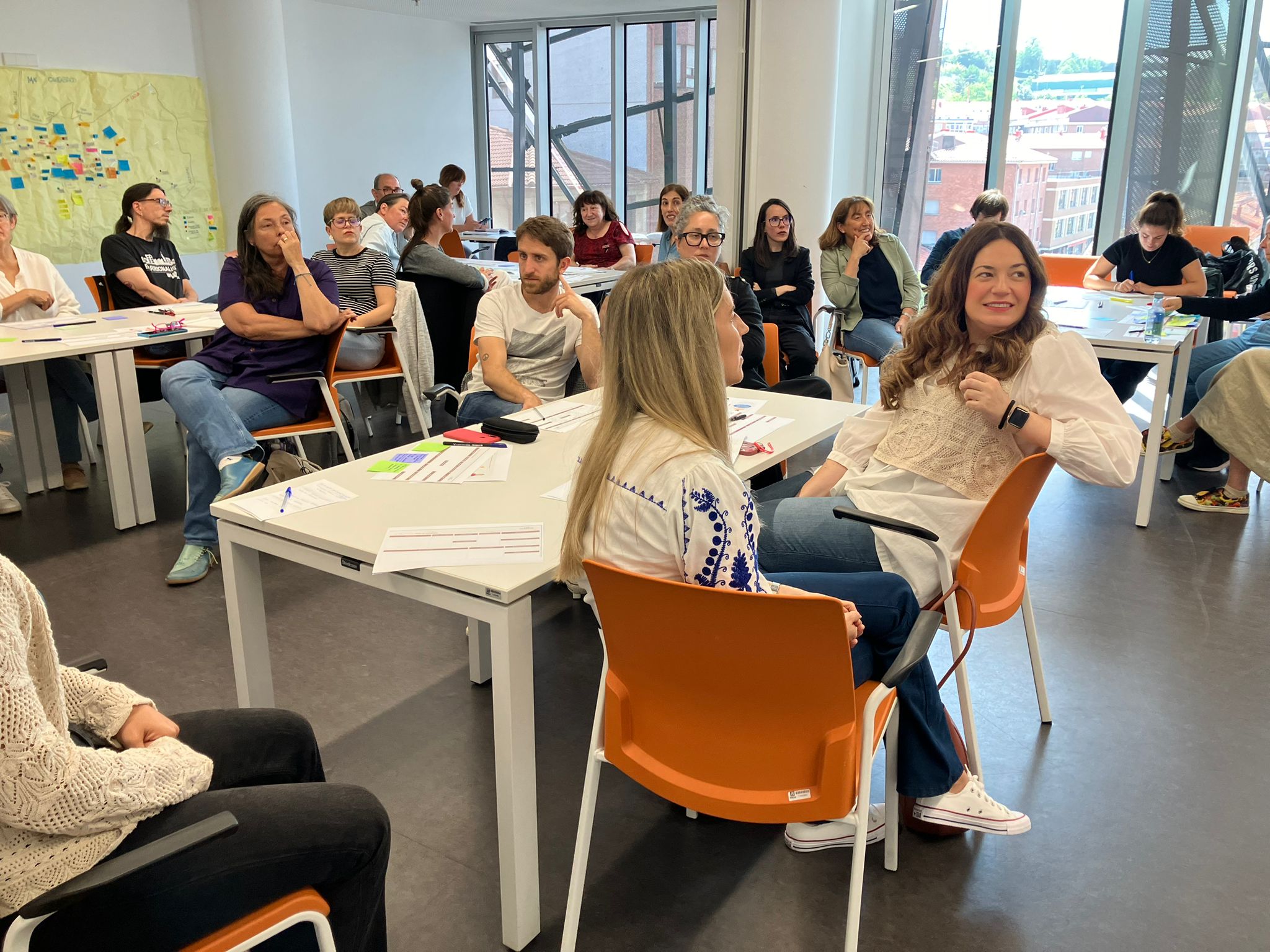
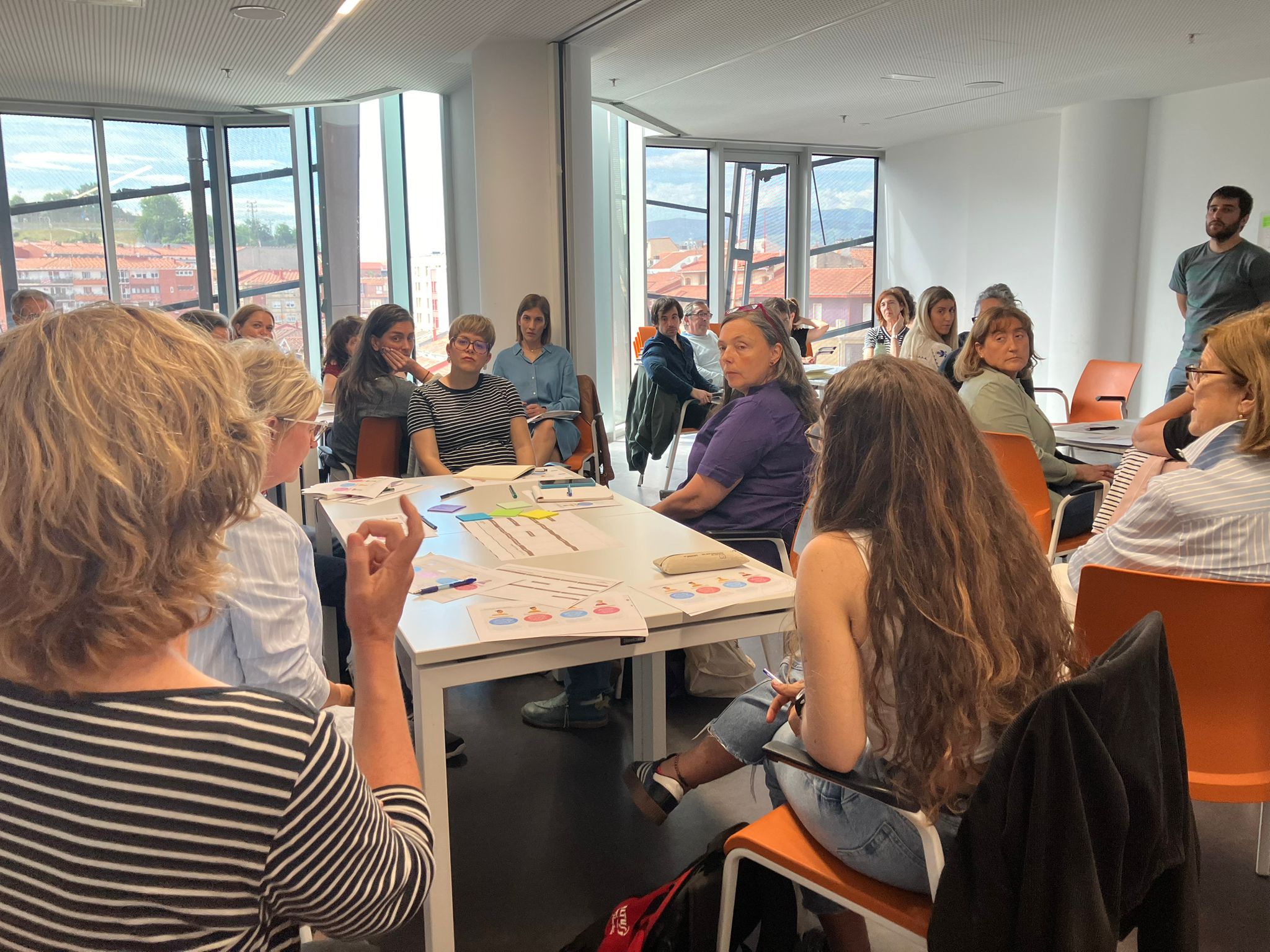
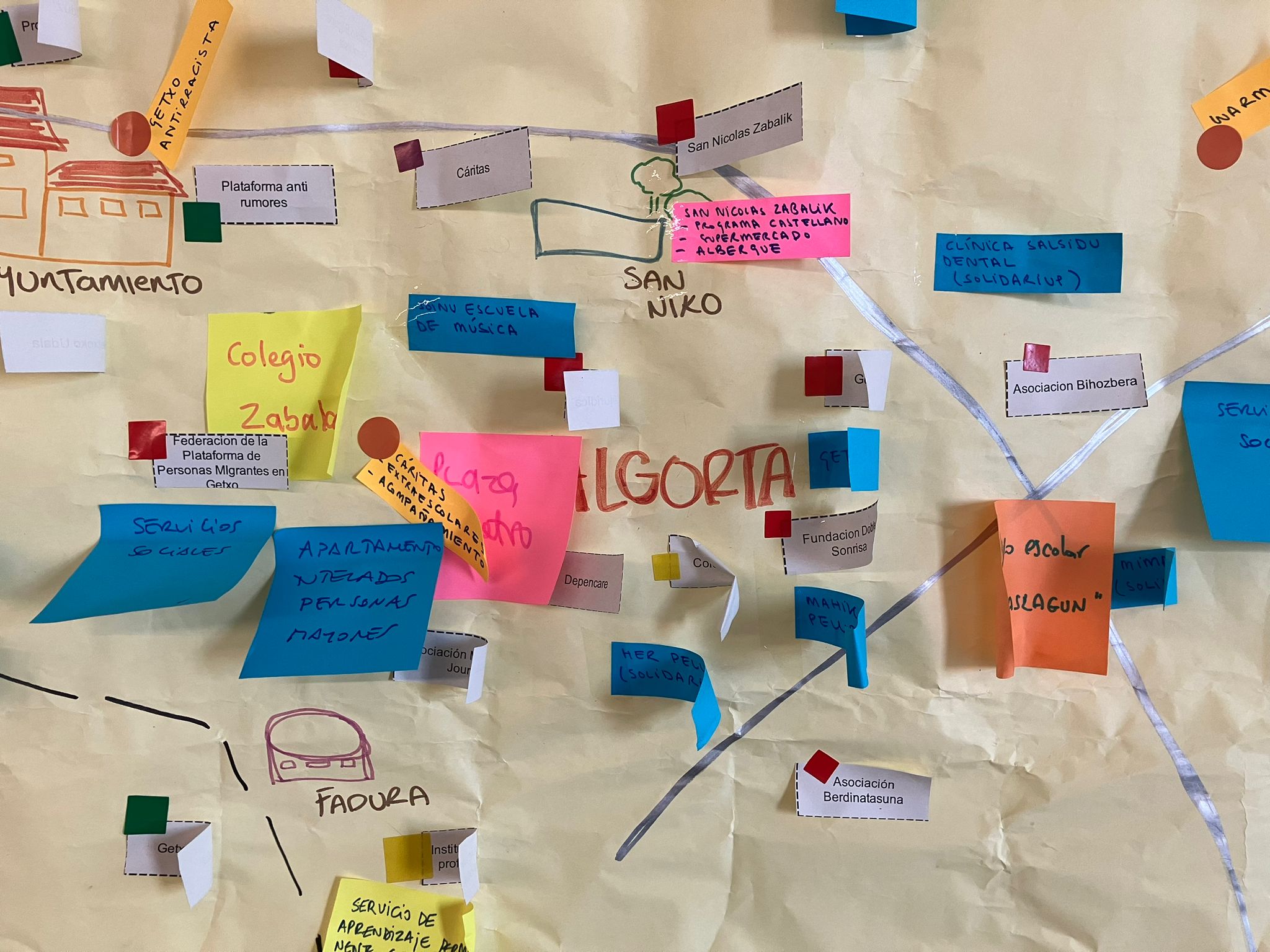
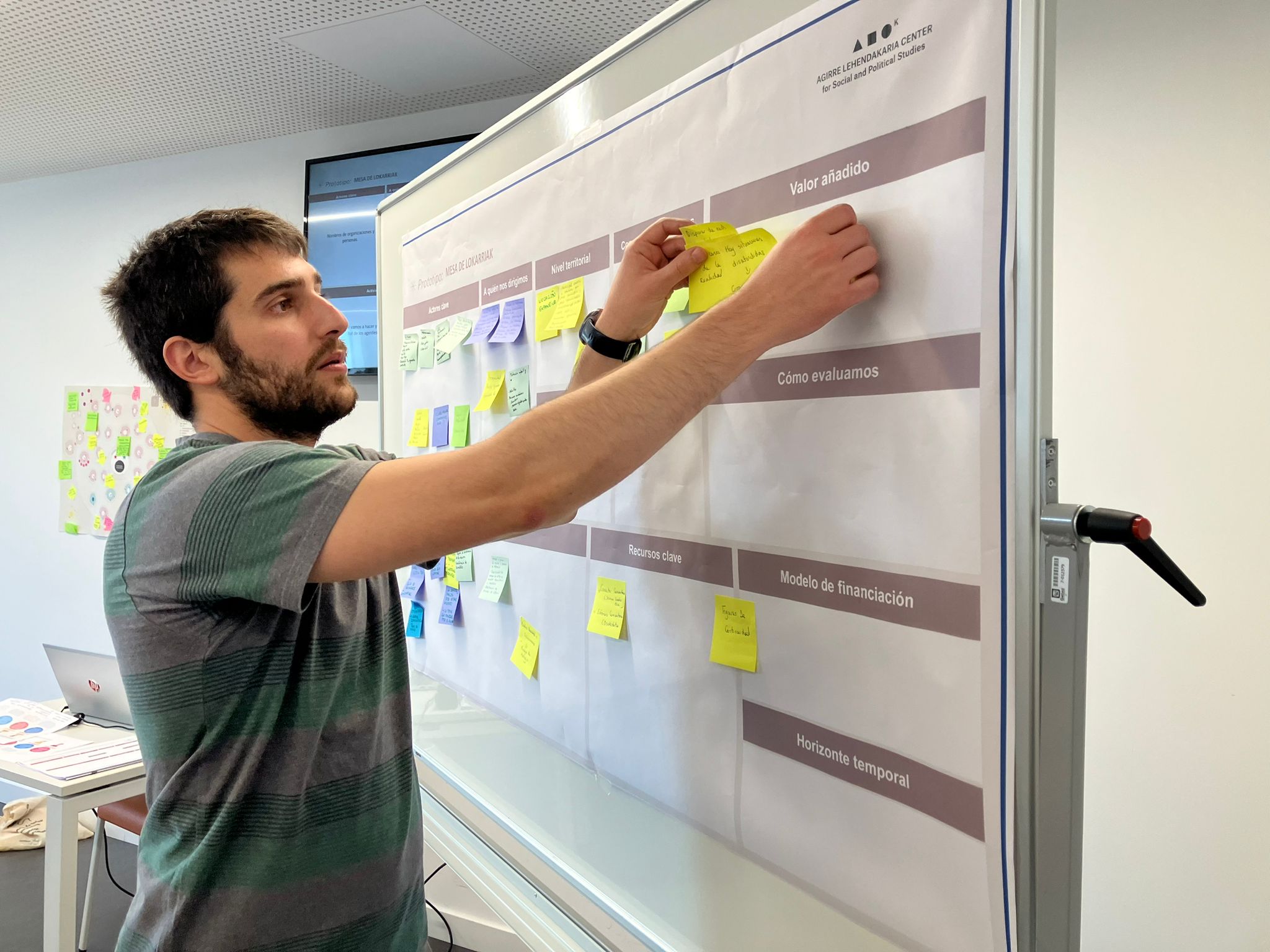
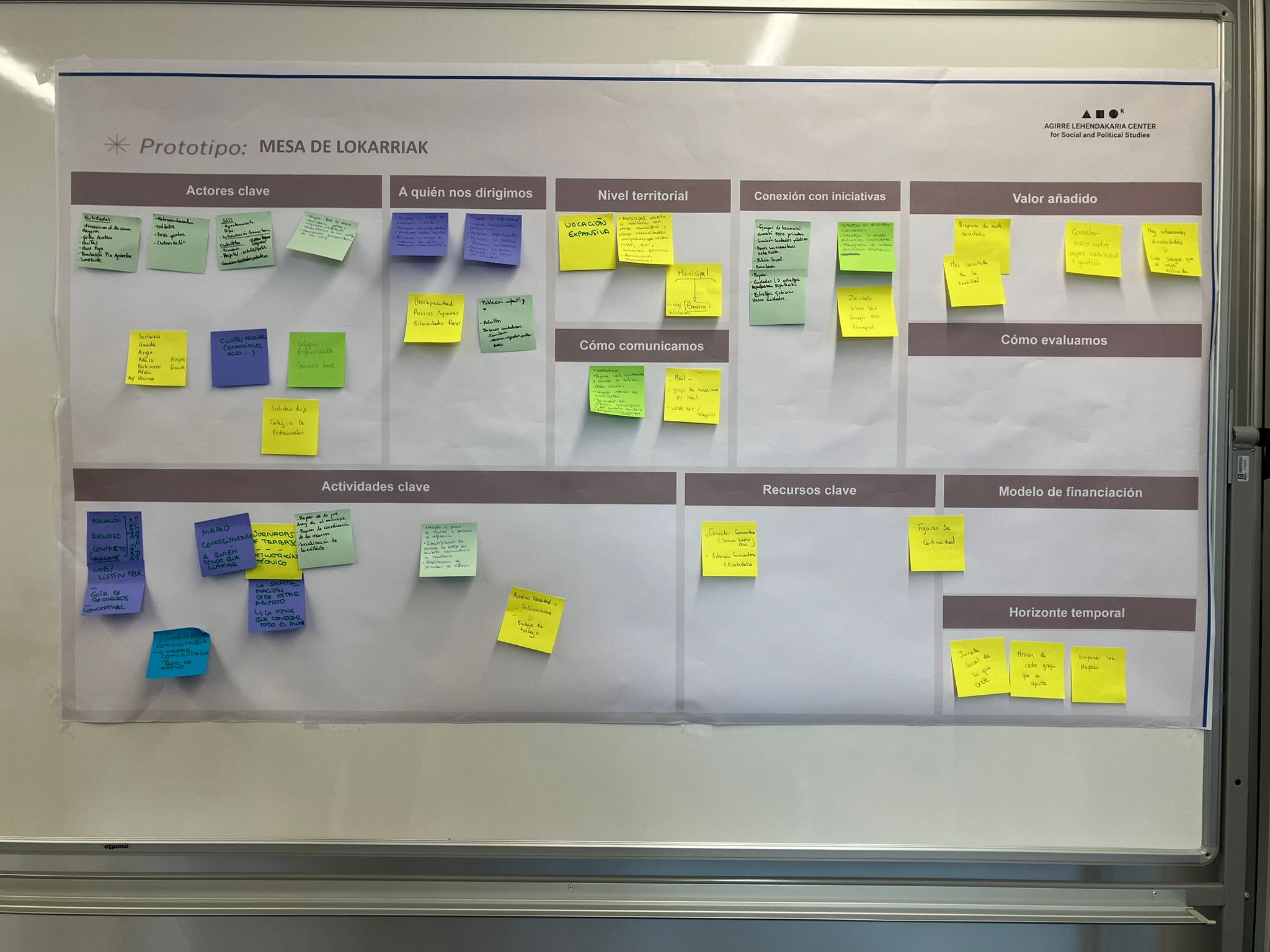
Ver más